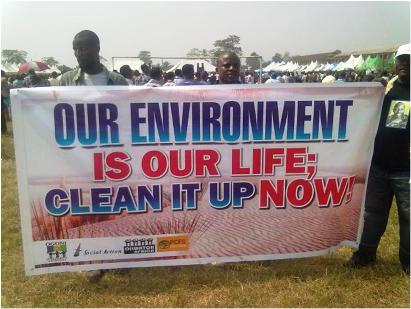The 30-day ultimatum issued to the Federal Government of Nigeria by the Movement for the Survival of Ogoni People (MOSOP) over the delayed clean-up of the devastated Ogoni environment did not come as a surprise to observers. The President was widely acclaimed when he declared that the implementation of the UNEP report, released on 4 August 2011, would be fast-tracked. That was five months ago. The initial things that were expected to be done include populating and inauguration of the structures that would over see the implementation exercise. These have not been done. Without these basic structures nothing else can happen.

In the words of MOSOP president, Mr. Legborsi Pyagbara, “We are seizing this opportunity to remind the government that the unusual delay for the take-off of the project is becoming unbearable and indeed taxing our patience.” He went on to urge the Federal Government to announce the structures and the roadmap for the implementation of the report in a manner that respects the sensibilities of the communities.
He further stated, “The ongoing delay on the part of the government will continue to be seen as an act of genocide being committed against the Ogoni people. We are giving the Federal Government a 30-day ultimatum to commence the implementation of the report or we will take up a series of non-violent measures to press for our demand.”
The struggle by the Ogoni people took on special impetus in 1993 at the maiden Ogoni Day celebration at which event Shell, the oil company most implicated in the decimation of the Ogoni environment, was declared persona non grata in Ogoniland. The present ultimatum was issued at a rally held to mark the 23rd anniversary of the epochal Ogoni Day on 4 January 2016.
Characterising the slow track on which the implementation process appears to be stuck as perpetuating genocide against the Ogoni people may appear to be rather strong language, but what are the true implications of continued inaction? Disease, poverty and very high mortality rates.
The level of pollution in Ogoni is absolutely astonishing. One can easily become dizzy, just stepping into some of the communities due to the heavy cloak of hydrocarbons fumes hanging in the air. Oil spills clog the streams, creeks and swamps and in some places dribbles of the noxious substance are found along community footpaths. Making matters worse is the fact that some of the spills that occurred years and decades ago have been either ignored or have been shoddily handled. Feeble attempts have been made at K-Dere to cover up decades old soil spill with soil.
Examples of crude covered environment dot the K-Dere, Bodo, Goi and other communities. What we see in Ogoni is sheer ecocide.
UNEP specifically called for emergency actions with regard to some of the heavily polluted areas such as Nisisioken Ogale. Here is what UNEP said in a press release issued on the occasion of the release of their report about five years ago:
“In at least 10 Ogoni communities where drinking water is contaminated with high levels of hydrocarbons, public health is seriously threatened, according to the assessment that was released today.
“In one community, at Nisisioken Ogale, in western Ogoniland, families are drinking water from wells that is contaminated with benzene– a known carcinogen–at levels over 900 times above World Health Organization guidelines. The site is close to a Nigerian National Petroleum Company pipeline.
“UNEP scientists found an 8 cm layer of refined oil floating on the groundwater which serves the wells. This was reportedly linked to an oil spill which occurred more than six years ago.
“While the report provides clear operational recommendations for addressing the widespread oil pollution across Ogoniland, UNEP recommends that the contamination in Nisisioken Ogale warrants emergency action ahead of all other remediation efforts.”
The clean up of Ogoni environment will not be a 100m sprint, but a marathon requiring 25-30 years of dedicated work to accomplish. We are inching towards the five years mark since the alarm bells sounded at the release of the UNEP report. It is five months since President Buhari announced he would fast-track the implementation of the report. We cannot see anything happening on the ground, as attested to by MOSOP.
Dwindling oil revenue should not be an excuse for not cleaning up the environment of Ogoniland, the Niger Delta and other polluted places in Nigeria. It should rather be an impetus for taking the clean up challenge and punishing polluters who are hooked on habitually corrupting our environment. Ecological corruption is more deadly than financial corruption as it sentences whole communities of humans and other species to ill health and death.
Let the clean up shift form the slow track to the announced fast track. And let the 30-day ultimatum be an encouragement to do so. The Ogoni people have been supremely patient and further testing of their patience would not be the best way to go.
By Nnimmo Bassey (Director, Health of Mother Earth Foundation – HOMEF)
